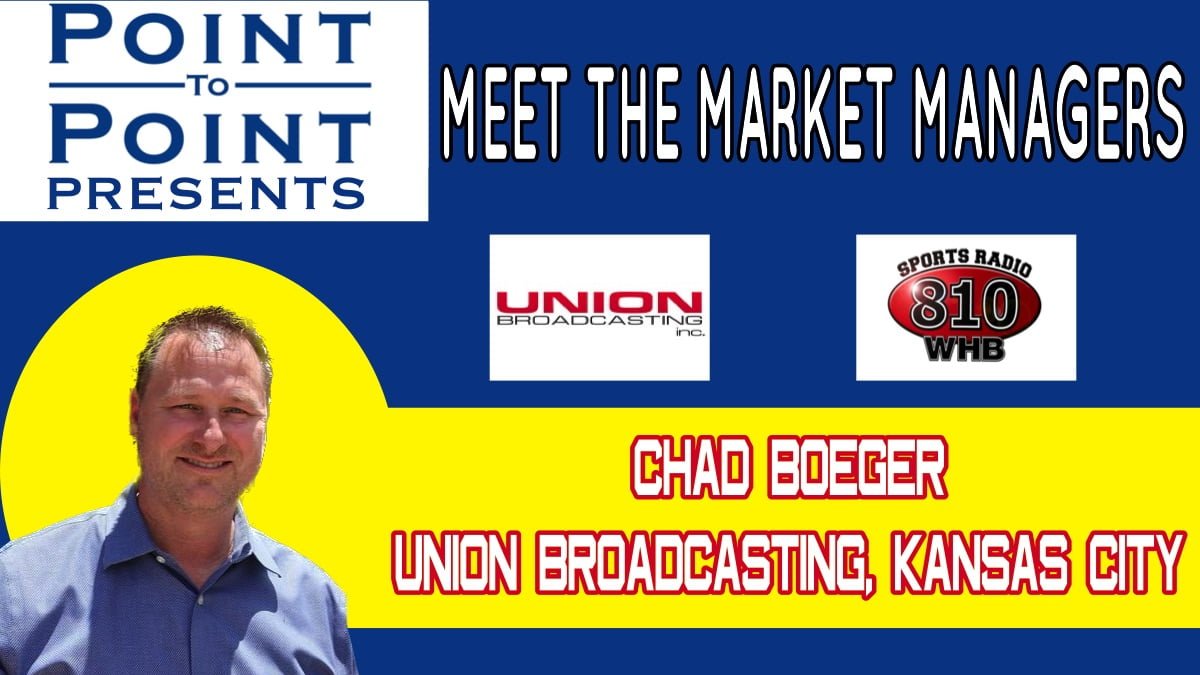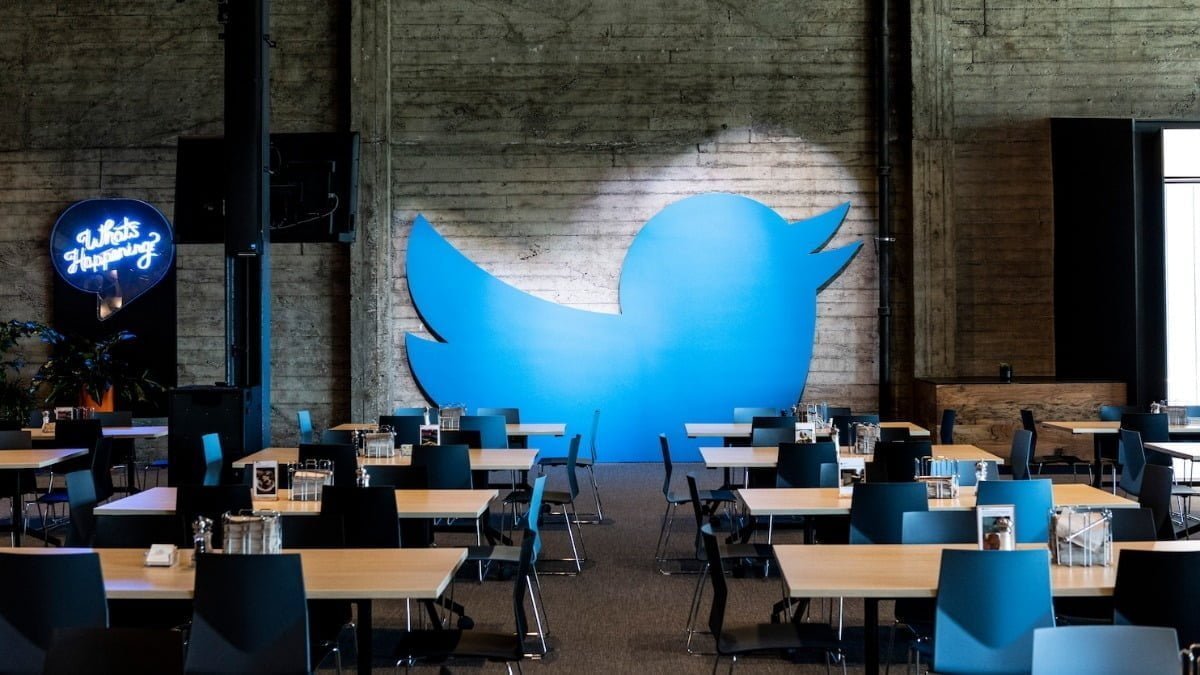And so we come to the end of another season of Meet the Market Managers. The final conversation in our series presented by Point to Point Marketing is with Chad Boeger of Union Broadcasting.
Union is based in Kansas City, but also operates sports talk stations in Wichita and Louisville. Boeger has used lessons learned in each building to grow business in the others. He and the company have been pretty successful do, demonstrated by the fact that there isn’t a lot of turnover at his stations.
In our conversation, we discuss the company’s significant investment in digital content and advertising, why there is still an advantage an AM signal has over an app and the value of high school sports as a marketing tool.
Demetri Ravanos: How much turnover is there in your company? I don’t recall ever seeing a lot of job openings posted there.
Chad Boeger: We’ve been very consistent. I mean for 20 years, I think I’ve been here. For the most part, those years, you know, a lot of people will come to the company and stay. We have a veteran group.
We always try to continue to add and expand. We have added several pieces, whether it’s salespeople or reporters or digital and social content managers, things like that. So we’re definitely expanding, but we haven’t had a lot of people leave the company over the years.
DR: You hit on the social side of things. As clients have started to better understand the value of advertising and having a presence both digitally and on social platforms in general, has it changed the way you utilize your staff at all? Have positions or responsibilities changed to reflect those needs?
CB: You know, our company at one point was radio. That’s what we did, and as most companies have, we have too. Radio is still an extremely important part of what we do, but we have expanded in a lot of different directions. This is no longer a radio company, but a media company.
I’ll give you some examples. We expanded to where we just opened up a brand new video facility. It’s about 2500 square feet. It’s a whole separate property, but it’s another part of our business. So we have video space. We have two podcast studios. We can do television commercials. We do social posts for companies. It’s all part of the expansion project.
DR: People consume your content through all sorts of different means. I do have to ask you about the fight to keep AM radio in new car models because WHB, as on-air product is only on the AM dial. Have you devoted time and resources to figuring that out or is the messaging more “you can get the same content through the app?” What do you want listeners to know?
CB: It is important for AM to continue to stay in vehicles. So we’re 100% behind that. I think you are seeing that some of those listeners are moving from the radio to listening online or listening to podcasts or whatever it may be.
But, you know, our signal is 50,000 watts. It covers 43,000 square miles in portions of five states. We hit a massive amount of people throughout the states of Kansas and Missouri. So keeping that easy to access in the car is very important to us.
DR: The last one of these I did was with Chris Soechtig, who runs IHeartMedia’s cluster down in Tampa. He was talking about being the Buccaneers’ flagship stations and that it’s really is more of a marketing kind of play for them – getting to go out and say that their sports station is the Buccaneers’ station opens some doors with advertisers and then with the rock station being the flagship, that leads to better ratings.
One thing that strikes me excuse me as I look at your site is you guys pretty prominently featured that link to the 810 Varsity site. When you are doing so much advertising with local businesses, how important is it to be able to show off something like that to show how invested you are in the Kansas City community? I would imagine that high school sports in that area are maybe a different, but perhaps a just as effective marketing tool for you.
CB: I think people know that we’re locally owned and operated, and that goes so far because people know how much we are part of the community. They look to us not only for sports news, but to be a leader within the community.
Our organization works with hundreds of charities throughout the year. There’s not a week that goes by that we’re not part of or promoting some philanthropic endeavor. It could be a golf tournament, a run, an event, or one of our personalities hosting something. There was a boxing match last week between firefighters and police officers and our morning show host, Steven St. John was the ring announcer and came in wearing the gear and was hosting that event. So, you know, from a from a community standpoint and us being involved was was was vital for our organization and something we put quite a bit into, not only through our on air product but through our staff.
From a high school standpoint, we started our high school game of the week back in 1998. We’ve always tried to get around the market to a number of different areas. 810 Varsity is just an extension of something we try to do. We’re partners with that organization, too. We have live broadcast, we have video of up to 15 games a week, and we do pre and postgame hits on the radio. But it’s also something where, if a viewer can’t get to a game, if they have family members playing in the game but they live in another city, they can watch it. They can see the stream.
There’s quite a bit that we do from all angles. Being a community station is something we’ve always put one of our highest priorities on.
DR: When you have a reputation for being a part of the community in that way, I know this is sort of an old-school stereotype of sports radio, but I do wonder if you ever still as the GM are fielding calls about hosts being too negative. Obviously, that isn’t a concern with the Chiefs now, but given how much of your business is about Kansas City, have you seen that listeners, at times, expect the station to be more of a cheerleader than a news and commentary outlet?
CB: I think that’s the opposite with us. I think people that want the news and they want to know what’s going on. We’ve always tried to make you think about everything that’s going on within the sports world. We’re going to give you the news and try to get be first, but more than first, accurate.
We make sure we cover the teams the way they need to be covered, whether that’s positive, negative, or indifferent. But it is news, and so we make sure we’re covering every event we need to be at. If it’s a Super Bowl, we’re all over the Super Bowl or the Final Four or, next week, you know, it’s Big 12 Media Days or the American Century Championship Golf Classic will be there. We’re covering all events that have Kansas City storylines.
We’re not the cheerleader. We’re definitely not. We’re going to go ahead and cover it the way we need to cover it, and that’s the way the listener wants us to do it.
DR: What is your perception of the hierarchy of what the listeners want in Kansas City? I would imagine right now the Chiefs are on top, but after that is it KU? Is it the Royals? After the Chiefs, where do the majority of eyes and ears go?
CB: Well, no question that the Chiefs coverage is enormous. I’ve never seen it like it is for the past five years.
Football is definitely the dominant product. After that, I think obviously people are passionate about the Royals, but the Royals have struggled. Where conversation at this time of the year you’d hope would be about baseball, it has sort of turned into ‘Is there going to be a new baseball stadium?’ and where it is going to go.
The owner of the Royals had a press conference about that topic. It was not necessarily solely about the new stadium, but it turned into a conversation about the new stadium. So I would say, you know, after the Chiefs and football in general, you’re kind of coming into the local schools here in this area – Kansas, Kansas State of Missouri. That’s both football and basketball. Then you do have Sporting Kansas City and the Kansas City Current. You know there are a lot of minor league teams in Kansas Cit too. I would say the hierarchy obviously is Chiefs head and shoulders at the top. Then you have the colleges and Royals and then Sporting.
DR: The teams in Missouri obviously are very active in trying to get sports betting legalized. What about media outlets? Certainly being on the Kansas border, you can speak to the economic impact it has on your business and what it could do for others in Missouri.
CB: We experienced it in the state of Kansas last year and it was an influx of business for us through a number of different sportsbooks. Obviously, at some point, we feel Missouri is going to legalize it. We’ve seen it in Louisville with our stations there. Indiana had passed it several years ago. There was an impact. It wasn’t nearly like what we’ve seen here in Kansas City.
The state of Kentucky just passed it. It’s going to roll out we think is pretty similar to how it did here in the state of Kansas to where you’ll be able to place bets on games in time for football season. I think that’s going to have an enormous impact on on on business with quite a few sportsbooks in that market.
We haven’t been asked to advocate at all. Our job is to anticipate and prepare.

Demetri Ravanos is a columnist and features writer for Barrett Media. He is also the creator of The Sports Podcast Festival, and a previous host on the Chewing Clock and Media Noise podcasts. He occasionally fills in on stations across the Carolinas in addition to hosting Panthers and College Football podcasts. His radio resume includes stops at WAVH and WZEW in Mobile, AL, WBPT in Birmingham, AL and WBBB, WPTK and WDNC in Raleigh, NC.
You can find him on Twitter @DemetriRavanos or reach him by email at DemetriTheGreek@gmail.com.







